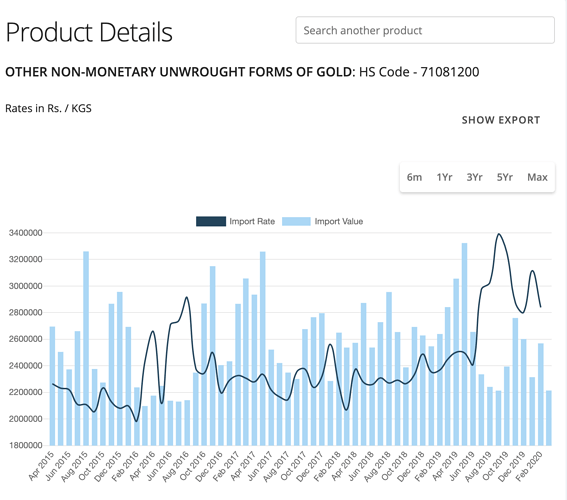if possible could you please point towards specific artifacts which provide proof for this (AR, any other artifact)? Im most interested in commentary on Gold and the large US orders which they had to fulfil in 3 months.
Sorry but I do not seem to find this drop in gold prices in the publicly available resources I’m looking up. For example, see:
The Gold price was roughly the same in FY18 and FY19. Then it is not clear how gold prices being low contributed to high ROCE.
Also, even if we believe that (i do not right now due to the charts I am reading, please do correct me if im reading the wrong charts), this seems to indicate that the company has little to no pricing power. This is surprising given the segment the company is in. Is the final output (jewellery) more like a commodity? Are they unable to pass on increase in raw material prices to buyers? This would be a serious drawback for the company imo. In the next 1-2 years, global economy is expected to remain fragile and volatile, meaning that gold prices are expected to remain elevated. In such a scenario an investor might not want to be in any kind of a rush to invest in the company (meaning even if one does want to invest, there can potentially be better entry points in the future when the performance is worse due to higher gold prices).
Can you please provide a source for this? Also what does this screenshot depict?
I am personally much more ok with the rest of the large public shareholders, but number 6 worries me since it can potentially be a bad governance practice. Having said that I do agree with you that smaller companies generally do not have as good corporate governance as large ones, but present much larger wealth creation opportunities for the investors.
It can either be positive (if the transactions are at an arm’s length, indicating skin in the game for the shareholders). Or it can be negative if indirectly promoters have a stake in these companies or if the goldiam does business with these companies because how can they be expected to be neutral when the transaction can potentially benefit a shareholder? Btw some of these things might be unknowable since we will have to trust the management’s word on it.
Thank you so much for doing this. I would also suggest participating in any virtual AGM they might hold. Would allow us to see how other shareholders are thinking and dynamically ask the management questions which help us build more conviction in the business.
A couple of other things i wanted your views on since you have already invested so much time in this:
- Mr Damani is a multi billionaire. But he only holds 1% stake in the company. To me this reflects his lack of full conviction in the company (admittedly many great investors build conviction incrementally over time and not all at once). How do you view this?
- As per the ART of valuation thread I think about companies i have started thinking about companies in terms of Value Addition. This does seem like the correct way to think (backtesting it on how companies have been valued in past). Is goldiam adding value for customers? Are its products differentiated versus their competitors? Who are Goldiam’s competitors and how much of a competitive advantage does Goldiam have? All of these become good questions in trying to think about what kind of valuations could Goldiam have in the future. A company selling jewellery to users should potentially have a high valuation IMO, but the degree of that high valuation is tied to the strength/longevity of the moat the company possesses. For example Tiffany’s in the US has a clear brand value moat and despite selling the same quality jewellery as the guy next door they can sell at a higher price and in fact to some extent, their products’ demands follows an inverse relation with price, the higher the price, the higher the demand! I know that Goldiam is way too small compared to Tiffany’s or even other jewellery manufacturers, but I wanted to see if we could get the management’s views on all of this. Do they seek to differentiate their products? how are they thinking about R&D? Do they have plans to make sure that they can protect margins against raw material price inflation?
All/Any of these questions if answered by the management would go a long way in helping investors build conviction and take even larger positions in the company.
Disc: I do not have any investment in the company but would look to add a small position if it comes back to near March-april lows.

